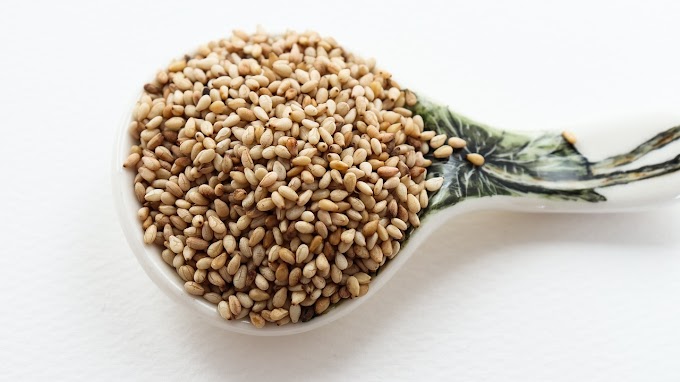Introduction
Sesame oil, derived from the seeds of the sesame plant (Sesamum indicum), stands as a versatile and time-honored elixir that has played a pivotal role in diverse cultures for centuries. With its rich history, distinctive flavor, and a plethora of applications ranging from culinary delights to medicinal remedies, sesame oil continues to captivate the attention of enthusiasts and health-conscious individuals alike. This comprehensive article delves deep into the multifaceted uses of sesame oil, unraveling its historical significance, health benefits, and practical applications that extend far beyond the kitchen.
I. Historical Significance of Sesame Oil
The use of sesame oil can be traced back thousands of years to ancient civilizations, particularly in regions such as Asia, the Middle East, and Africa. In Indian culture, sesame oil, also known as "til oil," holds a sacred place and is often used in religious rituals. Its significance extends to Asian cooking, where it has been a staple for enhancing the flavor of various dishes. It plays a key role in traditional dishes like tahini and halva in the Middle East.II. Culinary Marvels of Sesame Oil
Stir-Frying: One of the primary uses of sesame oil lies in the culinary world. Its high smoke point makes it ideal for stir-frying, a cooking technique popular in Asian cuisines. Sesame oil's ability to withstand high heat without breaking down or producing harmful compounds imparts a delightful flavor to stir-fried vegetables, meats, and noodles.Marinades and Dressings: The rich, nutty flavor and aromatic qualities of sesame oil make it a sought-after ingredient in marinades and dressings. When combined with other flavorful ingredients such as soy sauce, ginger, and garlic, sesame oil adds depth and complexity to various dishes.
Dipping Sauce: Sesame oil is a key component in Asian dipping sauces, contributing to the distinct taste of popular sauces like Goma dare in Japanese cuisine and the Chinese hot pot dipping sauce.
Flavor Enhancement: A mere drizzle of sesame oil over cooked dishes, such as rice, soups, or noodles, can elevate the overall taste and aroma. Its versatility in enhancing flavors makes it a favorite among chefs and home cooks alike.
III. Health Benefits of Sesame Oil
Heart Health: Sesame oil is not just a culinary delight; it also offers potential health benefits. Packed with antioxidants, including sesamol and sesamin, it may help reduce the oxidation of cholesterol, potentially lowering the risk of heart disease.Anti-Inflammatory Properties: The oil's anti-inflammatory properties make it a valuable component in managing conditions like arthritis and other inflammatory disorders. Regular consumption may contribute to overall joint health and well-being.
Skin Health: Topically, sesame oil is known to moisturize and protect the skin, making it a popular choice in cosmetics and skincare products. Its potential antibacterial properties can help reduce skin dryness and inflammation, promoting healthy and radiant skin.
Hair Care: In traditional medicine, sesame oil is often used to promote hair health. It is believed to reduce dandruff, nourish the scalp, and strengthen hair follicles, contributing to overall hair vitality.
Oral Health: Sesame oil finds a place in the practice of oil pulling, a technique involving swishing oil in the mouth. In this context, sesame oil is believed to offer potential oral health benefits, including reducing harmful bacteria and promoting overall oral hygiene.
IV. Medicinal and Therapeutic Applications
Massage Therapy: Sesame oil is valued for its ability to penetrate the skin, making it a preferred choice for massage therapy. It aids in improving circulation, relieving muscle tension, and promoting relaxation. The oil's use in massage has roots in traditional practices and continues to be a staple in wellness treatments.Ayurvedic Medicine: In Ayurveda, the traditional medicine system of India, sesame oil finds diverse applications. It is used in practices such as abhyanga, a self-massage technique believed to balance the body's doshas (constitutions) and promote overall well-being.
Lubrication and Detoxification: In some traditional practices, sesame oil is used for internal consumption as part of detoxification or purgative therapies. However, it is crucial to emphasize the importance of consulting with a healthcare professional before attempting such treatments.
V. Cultural Significance of Sesame Oil
Religious Ceremonies: Sesame oil holds a significant place in religious ceremonies across various cultures. Its use for anointing and consecration purposes symbolizes purity, divinity, and enlightenment. The oil becomes a conduit for invoking blessings and divine favor.Folk Medicine: In traditional medicine systems like Traditional Chinese Medicine (TCM) and Ayurveda, sesame oil has been used as a base for preparing medicinal formulations, ointments, and herbal remedies. Its application spans a diverse range of ailments, from digestive issues to joint pain and skin conditions.
VI. Modern Applications of Sesame Oil
Cosmetics and Skincare Products: Sesame oil's emollient properties make it a common ingredient in cosmetic and skincare products. It features moisturizers, soaps, and lotions, known for its ability to hydrate and nourish the skin without leaving a greasy residue.Pharmaceutical Preparations: Sesame oil serves as a carrier oil in various pharmaceutical preparations and herbal supplements. Its inclusion aids in the effective delivery of active ingredients, enhancing their bioavailability and therapeutic impact.
Industrial Applications: Beyond its traditional and culinary uses, sesame oil has found a place in industries as a lubricant for machinery. Its high viscosity and heat-resistant properties make it valuable in industrial processes, contributing to the production of paints, soaps, and other products.
VII. Sustainability and Culinary InnovationCulinary Landscape:
In the contemporary culinary landscape, sesame oil continues to inspire chefs and food enthusiasts to explore innovative ways of incorporating its unique flavor and nutritional benefits into a wide range of dishes. With an increasing focus on sustainable and healthy food choices, sesame oil's natural and nutrient-rich composition aligns well with the modern demand for wholesome and eco-friendly culinary ingredients.
VIII. Future Prospects and Ongoing ResearchScientific Exploration:
As scientific research and technological advancements progress, there is a growing interest in uncovering the multifaceted properties of sesame oil. Researchers are actively investigating its potential applications in fields such as functional foods, nutraceuticals, and sustainable agriculture. Ongoing studies aim to unveil its role in combating oxidative stress, supporting immune function, and promoting overall well-being.

Gourmet Exploration: In gourmet kitchens, chefs experiment with sesame oil to elevate the sophistication of dishes. Its complex nutty notes and versatility make it a favorite among culinary experts exploring haute cuisine and culinary experimentation.
Nutritional Aspects: Sesame oil isn't just a flavorful addition to dishes; it also contributes essential nutrients. Rich in polyunsaturated and monounsaturated fats, it provides a healthy source of fats that are beneficial for heart health when consumed in moderation.
Literary References: Throughout history, sesame oil has found mention in literature and poetry, becoming a symbol of richness and abundance. Its inclusion in literary works reflects its cultural significance and enduring appeal.
Eco-Friendly Packaging: As consumer awareness grows regarding sustainable practices, there is a trend towards eco-friendly packaging for sesame oil products. Manufacturers are exploring biodegradable and recyclable packaging options, aligning with the global movement towards sustainable living.
Cross-Cultural Adaptations: Sesame oil has transcended cultural boundaries, finding a place in diverse traditional medicine systems globally. Its adaptability and incorporation into different healing practices underscore its universal appeal.
Health and Wellness Retreats: Sesame oil's therapeutic properties have been included in health and wellness retreats. From massage therapies to culinary workshops, these retreats highlight the diverse applications of sesame oil in promoting physical and mental well-being.
Wellness Integration: The integration of sesame oil into modern wellness practices showcases its relevance in an era where ancient traditions and contemporary lifestyles coexist. From spa treatments to dietary supplements, sesame oil seamlessly transitions between the traditional and the modern.
Preservation of Heritage Techniques: Artisanal production methods often involve time-honored techniques passed down through generations. The preservation of these heritage techniques ensures the authenticity and quality of sesame oil, contributing to its continued significance.
Online Platforms and Social Media: The dissemination of information through online platforms and social media contributes to the global conversation around sesame oil. Cooking tutorials, health tips, and cultural anecdotes shared online contribute to a broader understanding of sesame oil's multifaceted nature.
Collaborations and Cross-Industry Applications: Collaborations between the culinary, health, and beauty industries may lead to new and exciting applications for sesame oil. Cross-industry partnerships could result in products that cater to holistic well-being, offering consumers a comprehensive experience.
Q1: What is the historical significance of sesame oil?

IX. Culinary Innovations and Sesame Oil
Global Fusion Cuisine: The global culinary landscape has witnessed a fusion of flavors, and sesame oil has been at the forefront of this culinary innovation. Chefs across cultures incorporate sesame oil into diverse cuisines, creating unique and delectable dishes that blend traditional and modern flavors.Gourmet Exploration: In gourmet kitchens, chefs experiment with sesame oil to elevate the sophistication of dishes. Its complex nutty notes and versatility make it a favorite among culinary experts exploring haute cuisine and culinary experimentation.
X. Sesame Oil in Everyday Wellness
Home Remedies: Beyond its role in traditional and alternative medicine, sesame oil has found its place in everyday wellness practices. Home remedies, such as oil pulling for oral health or topical application for skin ailments, showcase the enduring relevance of sesame oil in maintaining overall well-being.Nutritional Aspects: Sesame oil isn't just a flavorful addition to dishes; it also contributes essential nutrients. Rich in polyunsaturated and monounsaturated fats, it provides a healthy source of fats that are beneficial for heart health when consumed in moderation.
XI. Sesame Oil in Art and Culture
Artistic Representations: Sesame oil's influence extends to art, where it has been depicted in paintings, sculptures, and other artistic forms. Its golden hue often symbolizes prosperity, and artists use it as a medium to represent cultural and historical narratives.Literary References: Throughout history, sesame oil has found mention in literature and poetry, becoming a symbol of richness and abundance. Its inclusion in literary works reflects its cultural significance and enduring appeal.
XII. Environmental Impact and Sustainable Practices
Cultivation Practices: An exploration of sesame oil would be incomplete without considering its cultivation practices. Sesame plants are resilient and well-suited to arid environments, requiring less water compared to some other oilseed crops. This inherent hardiness contributes to sustainable agricultural practices.Eco-Friendly Packaging: As consumer awareness grows regarding sustainable practices, there is a trend towards eco-friendly packaging for sesame oil products. Manufacturers are exploring biodegradable and recyclable packaging options, aligning with the global movement towards sustainable living.
XIII. Sesame Oil in Traditional Medicine Systems
Ayurvedic Perspectives: Ayurveda, the ancient Indian system of medicine, considers sesame oil as a crucial component in various formulations. Its use in Ayurvedic practices extends beyond massages, encompassing medicinal concoctions designed to address specific health concerns.Cross-Cultural Adaptations: Sesame oil has transcended cultural boundaries, finding a place in diverse traditional medicine systems globally. Its adaptability and incorporation into different healing practices underscore its universal appeal.
XIV. Sesame Oil in Contemporary Wellness Trends
Functional Foods and Nutraceuticals: With an increasing focus on holistic health, sesame oil is gaining attention in the realm of functional foods and nutraceuticals. Products fortified with sesame oil extract aim to provide not only flavor but also potential health benefits, appealing to health-conscious consumers.Health and Wellness Retreats: Sesame oil's therapeutic properties have been included in health and wellness retreats. From massage therapies to culinary workshops, these retreats highlight the diverse applications of sesame oil in promoting physical and mental well-being.
XV. Sesame Oil: A Bridge Between Tradition and Modernity
Culinary Fusion: Sesame oil serves as a bridge between traditional culinary practices and modern gastronomy. Its ability to seamlessly integrate into a variety of cuisines speaks to its adaptability and timeless appeal.Wellness Integration: The integration of sesame oil into modern wellness practices showcases its relevance in an era where ancient traditions and contemporary lifestyles coexist. From spa treatments to dietary supplements, sesame oil seamlessly transitions between the traditional and the modern.
XVI. Sesame Oil in Artisanal and Small-Scale Industries
Community-Based Production: In many regions, sesame oil production remains a community-based endeavor, supporting artisanal and small-scale industries. This localized approach not only preserves traditional methods but also contributes to sustainable economic practices.Preservation of Heritage Techniques: Artisanal production methods often involve time-honored techniques passed down through generations. The preservation of these heritage techniques ensures the authenticity and quality of sesame oil, contributing to its continued significance.
XVII. Consumer Education and Awareness
Nutritional Workshops and Seminars: Educational initiatives, such as nutritional workshops and seminars, play a crucial role in raising awareness about the benefits of sesame oil. These events provide consumers with insights into its culinary uses, health benefits, and cultural significance.Online Platforms and Social Media: The dissemination of information through online platforms and social media contributes to the global conversation around sesame oil. Cooking tutorials, health tips, and cultural anecdotes shared online contribute to a broader understanding of sesame oil's multifaceted nature.
XVIII. Future Prospects: Sesame Oil in the 21st Century
Technological Advancements: As technology advances, there is potential for innovative extraction methods and product development. Extraction techniques that preserve the oil's nutritional properties and minimize environmental impact could become a focus of future research and development.Collaborations and Cross-Industry Applications: Collaborations between the culinary, health, and beauty industries may lead to new and exciting applications for sesame oil. Cross-industry partnerships could result in products that cater to holistic well-being, offering consumers a comprehensive experience.
In Conclusion:
In conclusion, sesame oil's journey from ancient civilizations to the contemporary world is marked by its versatility, cultural significance, and enduring appeal. As we continue to unravel the layers of its culinary, medicinal, and cultural tapestry, sesame oil remains a symbol of interconnectedness—a thread that weaves through time, connecting traditions, innovations, and the shared experiences of humanity. Whether in the kitchen, the spa, or the fields where it is cultivated, sesame oil stands as a testament to the richness of our heritage and the promise of a sustainable and holistic future.FAQ's
Sesame oil has a rich historical significance, dating back thousands of years to ancient civilizations in Asia, the Middle East, and Africa. It holds a sacred place in Indian culture, is a staple in Asian cooking, and plays a key role in traditional Middle Eastern dishes like tahini and halva.
Q2: What are the primary culinary uses of sesame oil?
Q2: What are the primary culinary uses of sesame oil?
Sesame oil is widely used in various culinary applications, including stir-frying, marinating, dressing, and as a flavorful drizzle over cooked dishes. Its high smoke point makes it ideal for stir-frying, and its rich, nutty flavor enhances the taste of a variety of dishes.
Q3: What health benefits does sesame oil offer?
Q3: What health benefits does sesame oil offer?
Sesame oil provides potential health benefits, including heart health due to its antioxidants, anti-inflammatory properties that may aid in conditions like arthritis, and skin health benefits when used topically. It is also believed to contribute to hair care and oral health.
Q4: How is sesame oil used in traditional and alternative medicine?
Q4: How is sesame oil used in traditional and alternative medicine?
Sesame oil finds application in traditional practices such as massage therapy, where its ability to penetrate the skin is valued. In Ayurveda, it is used for practices like abhyanga (self-massage), and in some traditional medicine systems, it serves as a base for preparing medicinal formulations.
Q5: What is the cultural significance of sesame oil?
Q5: What is the cultural significance of sesame oil?
Sesame oil holds cultural and symbolic importance in various traditions worldwide. In Asian cultures, it symbolizes prosperity and fertility, used in religious rites for blessings. In Africa, it signifies purity, healing, and protection, employed in cultural ceremonies.
Q6: How has sesame oil found modern applications beyond traditional uses?
Q6: How has sesame oil found modern applications beyond traditional uses?
Sesame oil has extended its influence into modern industries, featuring in cosmetics and skin care products due to its emollient properties. It also serves as a carrier oil in pharmaceutical preparations and finds applications in various industrial processes, such as lubrication.
Q7: How does sesame oil contribute to sustainability in agriculture?
Q7: How does sesame oil contribute to sustainability in agriculture?
Sesame plants are resilient and well-suited to arid environments, requiring less water compared to some other oilseed crops. This inherent hardiness contributes to sustainable agricultural practices, aligning with global efforts towards eco-friendly cultivation.
Q8: How is sesame oil integrated into contemporary wellness trends?
Q8: How is sesame oil integrated into contemporary wellness trends?
Sesame oil has become a part of contemporary wellness trends, featuring in health and wellness retreats, gourmet culinary experiences, and functional foods. Its inclusion in these trends reflects its adaptability to modern lifestyles.
Q9: What role does sesame oil play in artisanal and small-scale industries?
Q9: What role does sesame oil play in artisanal and small-scale industries?
Artisanal production of sesame oil often involves community-based efforts, supporting small-scale industries. These localized practices contribute to the preservation of traditional methods, ensuring authenticity and quality.
Q10: What is the future outlook for sesame oil in the 21st century?
Q10: What is the future outlook for sesame oil in the 21st century?
The future prospects for sesame oil include potential advancements in extraction methods, technological innovations, and collaborations between industries. Cross-industry applications may lead to new products catering to holistic well-being, reflecting a promising future for sesame oil.
These FAQs provide a concise overview of key aspects related to sesame oil, offering insights into its history, uses, health benefits, cultural significance, and future prospects.
These FAQs provide a concise overview of key aspects related to sesame oil, offering insights into its history, uses, health benefits, cultural significance, and future prospects.







